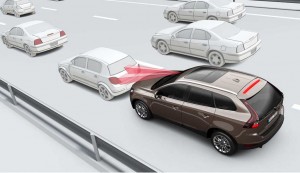
I See You: Volvo's City Safety system at work
Have you ever been involved in a collision when driving in the city? If not, you undoubtedly know someone who was. The surveys suggest more than 75 percent of all accidents occur at speeds below 18 mph, usually on city streets.
No wonder Volvo got a lot of attention when it introduced City Safety, a driver assistance system that prevents, or at least reduces the severity of, lower speeds crashes. Here in the U.S., the technology will become standard on all versions of the new XC60 crossover, which we reviewed, earlier in the week.
City Safety is already piling up the awards. It netted the ‘Traffic Safety Achievement Award,’ presented during the World Traffic Safety Symposium, in New York, last month, and February sees the Swedes garnering the prestigious Paul-Pietsch award.
Each year, the popular German monthly, Auto Motor und Sport, and its 24 international partner magazines organize the election for the most remarkable innovative technology. In 2008, BMW won the prize for its fuel saving EfficientDynamics package. This year, according to the jury, consisting of three members of the staff of AM&S and four research and development experts, City Safety gets the honors.
The technology uses infrared lasers and cameras mounted directly behind your rearview mirror. The system scans the road ahead looking for large obstacles – read cars, for City Safety is currently unable to sense smaller objects, like pedestrians, bicyclists or, of deep concern to Swedes and Sarah Palin, moose.
What’s critical is closing speed – the differential between your vehicle and the one ahead. If you’re moving too fast, City Safety may not be able to bring you to a complete halt in time, but will still slow you down enough to reduce injuries and vehicle damage. At slower speeds, the system will brake hard, at the last possible moment, to come to a complete halt for up to 1.5 seconds. After that, if the driver’s foot hasn’t manually depressed the brakes, the car will slowly creep forward.
The first maker to offer the technology – though others, including parent Ford Motor Co., are expect to follow – Volvo intends to begin offering City Safety across its line-up. And it is trying to convince insurance companies to lower premiums for cars equipped with the system.
The Paul-Pietsch-Preis of 25,000 euro (about $33,000) is granted to either a person, company, institution or organisation in Germany or abroad for important technology, deemed to be of influence in the future with respect to passenger car technology or design.
Paul Pietsch was the founder of Auto Motor und Sport and a former racing driver, who began his career in 1932, driving a Bugatti. In 1935, he raced for AutoUnion in the German Grand Prix and finished 3rd in the Italian team. From 1937 onwards he participated with a privateering Maserati and had his best moment during the 1939 German GP, leading from Lap 2 until the ignition failed, making him finish third. Now 97, Pietsch is the oldest surviving Formula One driver.
